#tatara totsuka
Text


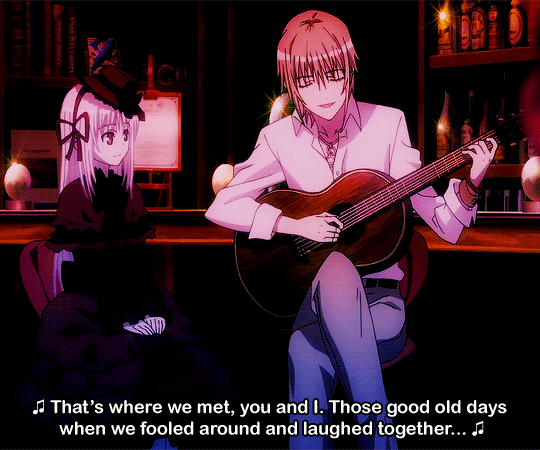



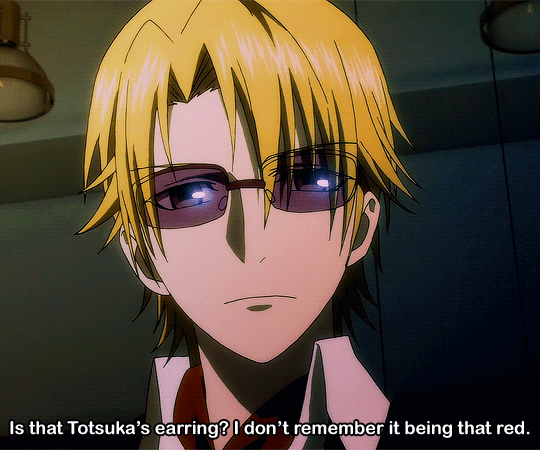
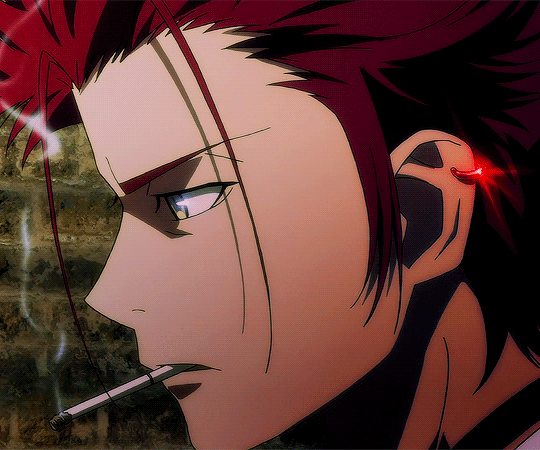
Tell me where you are...
No, you stay right there. Please don't do anything. We'll bring Totsuka back to you.
#creations#gifs#anime#k project#k seven stories#mikototsu#mikoto suoh#tatara totsuka#izumo kusanagi#climbing up and down the walls still abt this#on a scale of 1 to mikoto how well did u handle the death of ur s/o
179 notes
·
View notes
Text
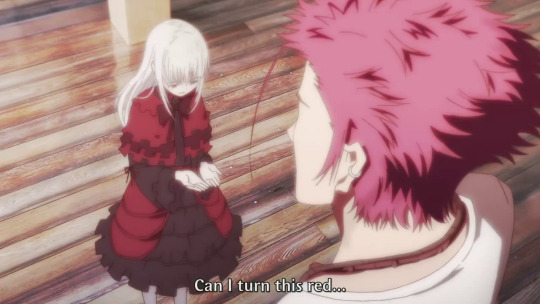

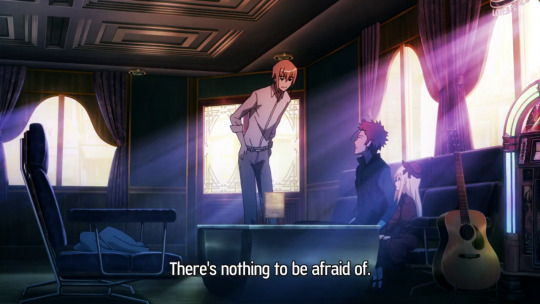




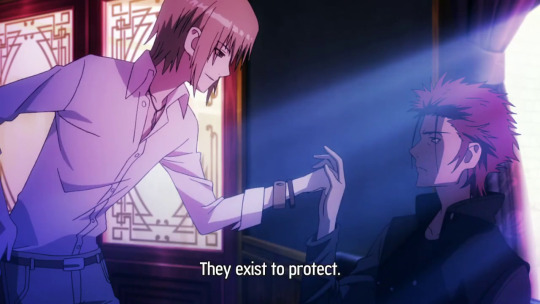



137 notes
·
View notes
Text
If I need to pull up receipts I'll happily do so but friendly reminder that
- The writers said that Mikoto and Totsuka had a "special relationship" that others would think is "unmanly" even going as far as to say their relationship was "kept a secret"
- Izumo saying that only Totsuka could tame the beast inside of Mikoto.
- Izumo ACKNOWLEDGING that he himself couldn't make Mikoto stay and understood Totsuka's important to Mikoto and why Mikoto had to do this.
- Don't forget that Mikoto and Totsuka were alone in heaven together with one bed. Homosexuals <3
- In the Kingdom of Red novel, the parallels to Ichigen telling Totsuka he'll find his king and Honami, Mikoto's teacher telling Mikoto that he's going to find someone that's going to break down his walls and be that important figure who's going to make him the center for everyone else
- How Totsuka Is the ONLY person that Mikoto goes "who hurt you" and is ready to rip heads off.
- In a side manga for a celebration, Izumo has literally thought about killing Mikoto to end his suffering, but Totsuka is there to remind him that Mikoto can be reigned back, his thoughts literally being "so many times I've thought: I should put an end to this. Grant him peace. But every time, you'd calm the flame".
- Mikoto doesn't genuinely smile. Only when he's with Totsuka. One of the writers kinda mentions this.
- Totsuka reads Mikoto like a freaking BOOK and knows his true feelings and inner thoughts. The writers talk about this.
- Totsuka is very important to Homra, to MIKOTO. So when he died, everything literally fell apart. I'm sorry, but only for Totsuka would Mikoto basically kill himself. If it was someone else important to him that died, he would get his revenge but not kill himself if Totsuka was there to reign him in.
- Mikoto was the very first attachment that Totsuka had gotten and also got incredibly attached to Homra. In Totsuka's childhood, he didn't have many real attachments outside of this.
Here's a couple of quotes by a writer regarding Mikoto and Totsuka's relationship
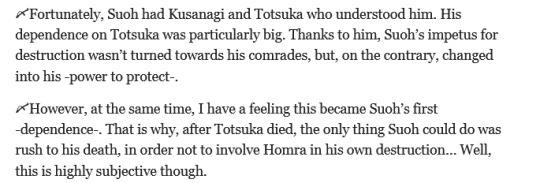
And what does Mikoto do on Valentine's Day? Immediately and ONLY think of Totsuka's birthday.

Also this hurts 😭😭

Anyways yea this is all I have to say for now. But I love them so much and they're canon and AHHHHHHHHHH
But yes pls come join me in Mikototsu hell <3
84 notes
·
View notes
Text
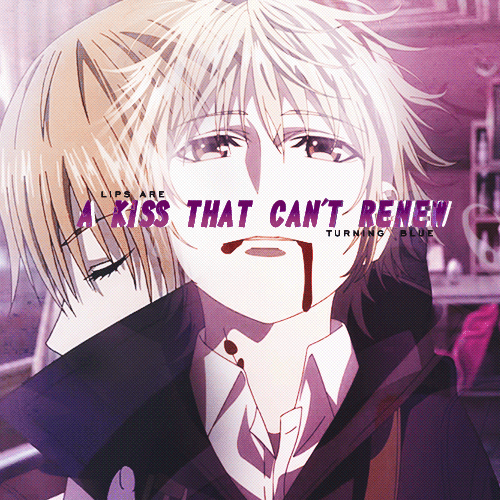

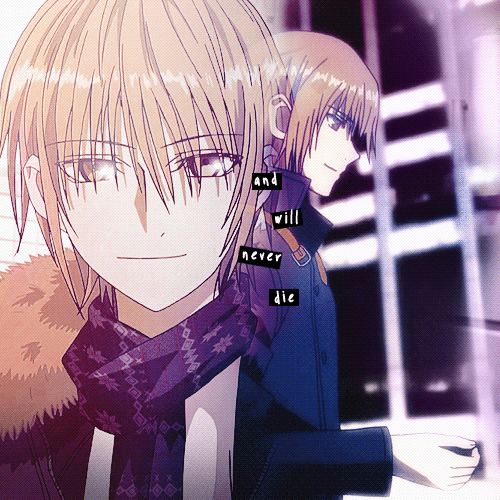

A n d f a l l i n g f r o m y o u r g r a c e...
Sing for absolution — Muse
#k project#project k#totsuka tatara#tatara totsuka#my graphics#ive been in an angsty mood lately and couldn't get this boy out of my head#i love him a normal healthy amount
24 notes
·
View notes
Text
Mikoto Suoh was in love with Tatara Totsuka. Tatara Totsuka was in love with Mikoto Suoh. They are happy together in the afterlife, sharing a pink bed. Their adoptive daughter, Anna, has characteristics of both of them. Totsuka was special to Mikoto; their relationship was special, even Gora said it. Mikototsu in canon, and everyone knows it
24 notes
·
View notes
Text
List of K Project names meanings master post
Remember when someone did a post to explain what the meanings of the names mean with the characters? Well, I am putting it here in this post.
The analysis and meaning of the names had already been done before but this post is about compiling all the meanings of the character's names here. I do not take any credit for the translations and the meanings belong to the original translators I am putting it here for reference.
I put their name meanings here in case someone is struggling to name there k project oc this is used as a reference to help.
The Silver Clan: White Rice Party
Yashiro Isana (伊佐那 社)
Isana (伊佐那), i (伊, that one), sa (佐, assistant, help) and na (那, what?). Yashiro (社, shrine)
Yashiros are temporary shrines set up for deities, this is a reference to how the body known as ‘Isana Yashiro’ (who is, in fact, Hieda Touru) is just a vessel for the silver king Adolf K. Weismann and not his true body much like how yashiro's body is temporarily used for a vessel for his soul.
His surname Isana (伊佐那) is derived from Izanagi (伊耶那岐命, Izanagi-no-Mikoto) and Izanami (伊耶那美命, Izanami-no-Mikoto) this is a reference to the twin heavenly deities in Shinto mythology who gave birth to the islands and made Japan and other Shinto deities of Japanese and represent life and death. This references his real identity as the first Silver King and the founder king being responsible for the birth of other kings
life and death play a part in Adolf and Claudia, which infers How Adolf became the silver king cursed with immortality after Claudia's death forced him to live while his sister was dead.
Besides being named after Izanagi Shiro’s last name has further significance in the story, Isana can be a play on his airy nature but refers to his amnesia in the story and his kind personality before regaining his memories.
Adolf K. Weismann
His real name “Adolf” comes from the Germanic name Adalwolf which means “noble wolf” and "wise wolf”, indicating both his nobilty in German myth wolfs are connected to kings and rulers which references his status as a king. This might infer the term "lone wolf” reference to his loneliness Of being selected as the king cursed to live as his sisters exiled himself from the world out of fear because he doesn’t want to involve himself with anyone that he eventually has to watch die yeah he doesn’t-have it off easily.
His initial K is a reference to the title of the series
Weissmann is a German surname meaning “white man” referencing to Shiro being the silver king.
His nickname “Shiro” can be written as “white" in Japanese. The term used for “Silver King” in Japanese, (白銀の王, Hakugin no Ō) has the character for "white” (haku,白) while “gin” means (銀, silver) in Weismman “Weis” means “white” in “German”, This references that Shiro is the first king the silver king.
Claudia Weismann
The name Claudia means "lame” or “crippled” but could probably be named after Saint Claudia, the Martyr of Rome who was mentioned in the New Testament, this can reference the impression that Claudia gives off that of the image of “the lost saint” and to how she She died saving Adolf life from falling debris from the bombing raid.
Claudia references Izanami as one of the creator gods in mythology She Along with her brother was in charge of the research of the slate that created the kings Izanami’s death references Claudia’s own death.
Neko “Miyabi Ameno” (雨乃雅日)
Ameno (雨乃), Ame (雨, rain), no (乃, from). Miya (雅, gracious. elegant, refined) and bi (日, day, sun).
Neko’s first name Miyabi(雅日) came from Wakahirume no mikoto (稚日女尊, Wakahirume-no- Mikoto.) the kanji “稚日女尊” is miswritten as "雅日女尊” since 稚&雅 look alike. Wakahirume is a weaving deity who served Amaterasu, says Susano threw a horse skinned alive into the room she weaving startled she fell off the loom and pricked herself by the shuttle of the loom this frightened Amatarsu she hid in the cave. this could reference to how Neko used her powers to change his memories hence hiding him from the other clansmen while preventing him from coming out of his metaphorical cave and how she hangs around Shiro.
the kanji can refer to how she is considered good-looking by the cast with sensual curves and her her bright sunny disposition.
Neko’s surname Ameno derives from Ameno Uzume (天宇受, Ameno Uzume) with the kanji changed. Ameno Uzume is the goddess of mirth who danced naked to draw Amaterasu out of hiding in her cave this is a node to how Neko is seen naked in the series and her role in drawing Shiro to come out of the metaphorical cave that he puts himself in. in the Kojiki it described her as “made the deities laugh” I think this can reference to how she brings Shiro happiness.
surname means “of rain” This is a reference to Neko’s love of baths even though she is a cat and rain is used to describe the sadness in her lonely life before she met Shiro
Neko’s name makes the beginning and end of Amatarasus's hiding along with the disaster due to the sun refusing to come out.
Kuroh Yatogami (夜刀神 狗朗)
Yatogami (夜刀神), Ya (夜, night) to (刀, sword, knife, blade) gami (神, god). Kuroh (狗朗), Ku (狗, dog) roh (朗, melodious, clear, bright, serene, cheerful). Kuroh’s surname Yatogami comes from Yato no gami (Yato no gami,
夜刀の神 ) are snake deities in Japanese folklore that are a symbol of enjoying peace and prosperity under a benevolent ruler but also have the power to kill a person and an entire family if someone sets their eyes on them. they are expelled from this original dwelling land the man who expelled them defied them and worshiped them at a place called Yashiro.
this references Kuroh's backstory, the deities rumored to bring familial extermination to anyone who saw them notes to how Kuroh is seen as an angel of death by his family and shunned by his own family after the deaths of his family, then his aunt and uncle. Like Yatogami he had to leave the place he grew up with and later ended up with Yashiro Isana like the Yashiro of the tale
the last kanji in his name refers to Kuroh's personality being honest, calm, and bright, the first kanji in his name means "dog”, and the pronunciation of “kuro” alone means “black in Japanese this contributes to his nickname “black dog”.
Kukuri commented that their names Kuro and Shiro are like Othella this plays into K focusing on contrastionals with the two main characters referring to it.
HOMRA
Suoh Mikoto (周防 尊)
Suoh (周防), Su (周, circumference, circuit) oh (防, protect, resist). Mikoto (尊, noble, exalted)
Mikoto (尊, Mikoto) is taken from the full name of the deity Susano-o no Mikoto (素戔嗚尊, Susano-o no Mikoto). Mikoto is named after the kami Susano, he is Amataerasu’s little brother and was originally in charge of the storms and seas he is known for his violent temper that caused problems, and was expelled from the heavenly realm. This refers to Mikoto's most prominent qualities as the red king being violent. Mikoto can reference his charisma as something he had before he became king
His last name Suoh (周防) comes from an old Japanese province of Yamaguchi Prefecture that is dedicated to a red tortoise in the Nihon Shoki and is well known for its chopper ore (a red color) in the Shoku Nihongi This is a reference to Mikoto being the red king and his hair color. the Yamaguchi Prefecture harbors the Tamanoya shrine that enshrines the creator of the Yata mirror and Yasakani magatama I find this fascinating that it references Yata and Anna from the Red clan.
his surname refers to his quiet kind nature in which he wants to protect others around him.
Izumo Kusanagi (草薙出雲)
Kusanagi (草薙) Kusa (草, grass, pasture, write) nagi (薙, mow down). Izumo (出雲) Izu (出, exit, come out, put out) mo (雲, cloud).
Kusanagi is named after the sword of Kusanagi (草薙剣, Kusanagi-no-tsurugi) one of the three imperial regalia of Japan which the sword itself represents valor. It's a sword that has a connection to Mikoto as with the legend that the sword is seen in the body of the servant that Susano slayed and presented it to Amaterasu to settle an old grievance. Kusanagi being named after a divine sword is a reference to his combat ability to how Izumo is the second strongest in Homura.
Izumo is the name of a shrine (出雲大社, Izumotaisha) that worships Susano's son, Izumo might refer to his role as an information pathway to Homra and his additional role as the one to clean up his clansmen's messes.
Totsuka Tatara (十束多々良)
Totsuka (十束多) to (十, ten) tsuka (束, bundle, manage, control). Tatara (多々良) ta (多, many, frequent, much) tata (多々, very much, very many) ra (良, good, pleasing, skilled)
Tostuka is derived from the sword of Totsuka (十束剣, Totsuka-no-Tsurugi) the sword of the kami susano the blade that Susano uses to slay the serpent. Also used by Izanangi to behead his son Kagutsuchi who is the kami of fire Kagutsu's death marked the beginning of death in the world. The sword was taken by the underworld when Izanagi came to visit Izanami the sword is made of metal a part of the element of earth connected with death. his name is from a kind of sword alludes to his hidden strength, and his role in Homra the peacemaker, and the beast tamer.
Tatara is derived from the tatara method of iron making, the tatara method uses iron sand dread old iron ore and smelts it in a hot fire. There is an old Japanese saying that those who work in Tatara iron making welcome the dead this is because dead bodies in Japanese lore represent the element of earth and iron metal is purified earth. The amount of dead in tatara works was said to increase during the purification process. iron is created from the dead and in the case of the sword also creates more dead people, while poisoning those who work with Tatara with death. his given name is an obvious reference to his overall personality and many hobbies
His entire name is closely connected with death with his given name dead from Tatara and metal/earth and with the beginning of death in the world and underworld from Totsuka no Tsurugi.
His name shows that he is created to die in some respects and his death was meant to be a catalyst for what happened with Homra
Yata Misaki (八田美咲)
Yata (八田) ya (八, eight) ta (田, rice field), Misaki (美咲) Mi (美, beauty, beautiful) saki (咲, blossom, bloom)
Despite the different kanji the word Misaki is used seen with how Misaki (御先, Misaki) can translate to vanguard also a term used to call small-scale divine spirits who are subordinates to high-ranking deities appearing as the deity's omen or messengers. Misaki is a homage to the Hinomisaki shrine (日御碕神社, Hinomisaki Jinja) which is a shrine and lighthouse, the upper shrine is dedicated to Susano, and the lower shrine to Amaterasu notes on how Yata is the vanguard of Homra.
his given name Misaki could be a play on how he doesn’t think before he acts more often than not ending up in all sorts of messes, his given name is revealed in a short story yatas mom named her children after plant theme.
the Yata comes from Yatagarasu (八咫烏) the three-legged crow sun incarnate and a symbol of guidance. Yatagarasu is the three-legged crow that guided Emperor Jimmu on his eastern expedition and is also said to live in the sun.
Yatagarsu is the misaki of Kumano no Ookami (熊野大神, Kumano no Ookami) also known as Susano o. This is a callback to how Yata is the vanguard of Homra serving under Mikoto and later Anna.
Yata is named after the mirror of Yata (八咫鏡, Yata no Kagami) one of the three imperial regalia in Japan the mirror represents honesty and wisdom. this notes how Yata is straightforward and honest about his emotions and his growth and maturity in the series. Yata’s name is connected to Fushimi Yatagarsu and Sarutahiko is known as guides of high-ranking diety both of them have names from guidance kami and are said to pave the way for the rulers. a clever reference to their relationship and their relationships with their respective kings.
eight is a lucky number in Japanese, which may be why he's been lucky so far hasn’t been gravely injured or near death, and rice fields are a source of food which is why he is so full of energy.
Anna Kushina (櫛名アンナ)
Kushina (櫛名) Kushi (櫛, comb) na (名, name, distinguished, reputation)
There is no meaning of Anna's name in Japanese but someone did make a post that might guess her name could come from the Christian Bible Apocrypha [Gospel of Jacob] What is Anna the mother of the virgin Mary Anna is known as a woman dressed in red which is annas signature color when she joins Homura and is regarded as a mystic which references Anna's powers of clairvoyance.
Anna’s last name, Kushina (櫛名) comes from the kami Kushinadahime (Kushinada-hime,櫛名田比売) She is the wife of the kami Susano with is associated with Suoh Mikoto. She was originally going to be eaten by Yamata no Orochi the eight-headed dragon but Susano slew it with Totsuka's sword after making a deal to save her in return for her hand in marriage Susano turned her into a comb to hide while he slew the snake she is named after Kushinadahime who was saved and married subsequently by Susano.
much like her kami counterpart Kushinadahime, Anna was rescued by Mikoto who is the counterpart for Susano. the snake, in fact, is Mizuchi, Mizuchi is based on the Orochi in mythology his kanji is a Japanese homophone of the water dragon. who kidnaps Kushina and he kidnaps Anna and makes her a king through his experiments. Anna’s ability and relationship to sync with Mikoto seem to represent the close relationship between Susano and Kushinadahime. Like Totsuka and Kusanagi her name is chosen because of her counterpart connection to Mikoto's counterpart as a close support of his
Kushi might be a reference to her short hair, "na" is connected to her position as Homra clairvoyant and later red king.
Honami Kushina (櫛名穂波)
Honami’s name (穂波) means “waving heads of grain”, it's mostly like she's a stand-in for Kushinada-hime’s elderly parents who asked for help from Susano. Kushinada-hime mother was a farmer and the goddess of an early harvest and gentle affection, gentle affection is associated with Honami
Rikio Kamamoto (鎌本力夫)
Riki(力,power, strength, strong, strain, bear up, exert) o (夫, man, husband). Kama (鎌,sickle) Moto (本, base, root, origin).
Rikio’s name is similar to the deity Ame-no-tajikarao (天手力男, Ame-no-tajikarao) with having the same kanji. Ame-no-tajikarao removed the cave door Amaterasu was hiding and pulled her out returning light to the world after she hid from Susano. He is said to have Herculean strength and the kami of power and sports this is a reference to Kamamoto's strength and how he gets Yata out of a depressed funk to get him to save Anna.
Saburōta Bandō (坂東三郎太)
San(三, three) ro (郎, son) ta (太, thick, big). Ban (坂, slope, hill) do (東, east)
Bandou is the old name for the Kanto region of Japan also refers to the Bandou Sajuusankashou (坂東三十三箇所, Bandō Sanjūsankasho) a series of 33 temples in the Kanto region dedicated to the goddess Kannon the personification of compassion and kindness also related to the Japanese daimyo named Satake yoshishige who went by the name bandou tarou this is where his entire name comes from. thinking about this it feels unlikely since Bando is considered petty by the rest of his clansmen but he has a strong sense of loyalty and compassion towards his fellow clanmen even Shohei points out his kindness.
Shōhei Akagi (赤城翔平)
Sho(翔, soar, fly) hei (平, level, even, peaceful, flat, board) Aka (赤, red). gi (城, castle)
Shohei’s surname Akagi is named after Akagi Mountain (赤城山), a stratovolcano with lava domes. the mountain itself is deified at Akagi Jinja at the base of the mountain.
his name comes from two navel ships the Akagi, and the Houshou (鳳翔).
Masaomi Dewa (出羽将臣)
Masa(将,general) omi (臣,retainer, subject) De (出, out). Wa (羽, feather)
Dewa’s given name from Dewa Sanzan (出羽三山, Dewa Sanzan) combination of three holy mountains and Dewasanjyodaigongen (出羽三所大権現) which is the veneration of all three mountains on top of Mount Haguro that are important in Buddhism and Shinto also shugendou.
It is said that Hachiko son of Emperor Sushun under the guidance of Yatagarasu was led to the mountains and then he deified them.
Yō Chitose (千歳洋)
Chi (千, thousand) tose (歳, years) ta (洋, an ocean, the East (Orient), the West (Occident).
His last name is Auspicoius also the name of a shrine in Hokkaido, the deified kami is Ichikishimahime (produced in the trial of pledge between Amaterasu and Susano) and Toyoukehime offspring of of Wakumusuhi. Whom Izanami bore as she lay dying giving birth to Kagutsu.
his given came from the navel ships Chitose and Chitose Maru.
Kōsuke Fujishima (藤島 幸助)
Fuji(藤, wisteria) shima (島, island) ko (幸, happiness, good luck). suke (助, help, rescue, assist)
His surname Kosuke can be a reference to his good nature in how he helped others and how he helped Eric out of his situation.
His surname came from Fujishima Jinja (藤島神社) in Fukui prefecture which deifies the military commander Nitta Yoshisada the great military commander during the Nanbokuchou period of Japan.
Eric Sōlt (エリック・スルト) real name Eric Surt
Eric grew up in Europe and his name is an English name, though the way his name is spelled in Japanese "スルト" is the same Japanese spelling for the Nordic god Surtr who plays a major part in Ragnarok carried a flaming sword and his flames with engulf the earth live in the fire realm, Muspell. this references the knife that Eric carries and his red aura.
Genji Kagutsu (迦具都 玄示)
Genji (玄示)Gen (玄, mysterious) ji (示,show), Kagutsu (迦具都) Ka (迦, sword) gu (具, ingredient) tsu (都, capital)
his first name meaning can reference how little people know about him except in flashbacks mentioned by other characters.
Kagutsu’s surname comes from Kagutsuchi (迦具土, Kagutsuchi the kami of fire, he was the child of Izanami and Izanagi his birth killed Izanmi in his rage Izanagi to the sword of Totsuka (also the Ame no Ohabari no Kami,天の尾羽張) and beheaded and dismembered Kagutsuchi. eight pieces of his body became eight volcanos. the death of Kagutsu started the cycle of death in the world. This pertains to the fiery imagery associated with Homra much like his counterpart, Kagutsu’s death was the first major death of the king, and his death by Habari Jin the blue king after which the sword was named. his presence had a huge impact on the events and characters around him.
Secptor 4
Munakata Reishi (宗像礼司)
Munakata (宗像) Muna (宗, religion, sect, denomination, main point, origin, essence) kata (像, image, statue, picture, figure, portrait). Reishi (礼司) Rei (礼, salute, bow, ceremony, thanks, remuneration) shi (司, officer, boss).
his name Reishi alludes to his position in Sceptor 4, being their boss.
Munakata is named after the three Munakata goddesses (宗像三女神, Munakata-no-kami) that were enshrined at Munakata Taisha in Fukuoka Prefecture. the goddesses were born when Susanoo made an oath with his sister Amaterasu, during this oath, she took Susano's sword purified it broke it with her teeth breathed it out the goddesses and their names are Tagorihime-no-Kami, Tagitsuhime-no-Kami, and Ichikishimahime-no-Kami who are the Munakata goddess. The Munakata goddesses are the goddesses of the sea and protectors of sailors and sea travelers. this fits well into his role as a protector using his blue aura to safeguard
the water imagery of Scepter 4 is meant to contrast with homras fire imagery
Seri Awashima (淡島世理)
Awashima (淡島) awa (淡,light, thin, faint, pale, fleeting) shima (島, island). seri (世理) se (世, world) ri (理, reason, logic)
Seri’s name notes Seri is more level-headed than the captain and the only sane one.
Awashima’s surname comes from Awashima no kami(淡島神), the second daughter born of Izanagi and Izanami but was deformed and not considered a god and set out to sea. She helps safe sea travel she is based on the kami for a woman known as teh protector of woman who blesses them in mythology.
This is noted that Awashima is the only woman in Sceptor 4 in combat. and how Scepter 4 is related to protection Her given name Seri comes from Suseri hime (須世理姫), daughter of the god Susano who was known to have helped her husband
Ookuniushi the deity of Izumo Taisha passed a harsh test on her father. Ookuniushi was the ruler of Izumo Provance is the counterpart of Kusanagi Izumo note both Kusanagi and awashima's relationship in the series as the clan's second heads.
Saruhiko Fushimi (伏見猿比古)
Fushimi (伏見) fushi (伏, bend down, bow, cover) mi (見, see, hopes, idea). Saruhiko (猿比古) saru (猿, monkey) hi (比, compare, race, ratio) ko (古, old)
Fushimi comes from Fushimi Inari (伏見稲荷) the grand shrine of inari, and is the daughter of Susano. Although a fox it can also take the form of a snake/dragon a water deity. Fushimi has strong connections with both Susano who is Mikoto’s counterpart and sea imagery which is represented in Sceptors 4.
Saruhiko’s name references Sarutahiko Ookami (猿田彦) leader of the earthly kami a symbol of strength, guidance, and martial arts. who guided Ninigi, Amatarusu's grandson who came to earth with the three scared treatures later enshrined at Fushimi Inari Taisha later in the myth the god Sarutahiko died by drowning. the sacred treatures are connected to homra which are based on the sacred three treatures. Sarutahiko is related to the Yata name Yata no kagami is also connected to Sarutahiko, fushimi and yata are both named after kami of guidance, their frequent use in vanguard-like positions shows that they are both people who pave the way or guide the way.
the name Saru was given to him by his father In the story because he mentioned his son looks like a monkey which he himself hates to be called because it reminds him of his father.
like most Scepter 4 people he's named after a Japanese naval ship
Fushimi Niki (伏見仁希) and Kisa Fushimi (伏見木佐)
Fushimi (伏見) fushi (伏, bend down, bow, cover) mi (見, see, hopes, idea). Niki (仁希) Ni (仁, benevolence) Ki (希, to hope)Fushimi (伏見) fushi (伏, bend down, bow, cover) mi (見, see, hopes, idea). Kisa (木佐) Ki (木, tree) sa (佐, assistant)
Niki Fushimi is named after Ninigi (瓊瓊) he appeared in the story coming to earth with the three scared treatures and being guided by Sarutahiko his son's name and is married to Konohana Sakuya the namesake of his wife.
For Kisa Fushimi, Konohana sakuya (木花開耶姫, Konohanasakuya-hime) is the kami who was the inpiration for Kisa’s name. In the story, she was sent to marry Ninigi and had three children with him representing mountains, fire, and water. Her older sister Iwanaga-hime was originally supposed to marry Ninigo but was rejected the lives of the humans would be sort as the cherry blossoms, this bares some semblance like the story where Kisa married Niki solely for his talent nothing else, and how ayas mother hates Fushimi mom
there interconnected to fushimi in a way as seen in there myth how the charcater in the myth are interconnected.
Oogai Aya (大貝阿耶)
Oogai (大貝) Oo (大,big) Gai (貝, shell). Aya (阿耶) A (阿, to flatter; to pander to the ridge (of the roof); eaves) ya (耶, question mark)
the kanji for ayas name is a reference to the story of the kami Sarutahiko Ookami, while he was fishing off of the coast of Azaka he got his hand stuck inside a large clam and drowned. her surname references the clam that Sarutahiko was stuck in.
Her name Aya (阿耶) is taken from Azaka (阿耶訶), the place where Sarutahiko drowned. This is a reference to how her presence in the story is meant to drive a wedge between Fushimi and Homra
Himori Akiyama (氷杜 秋山)
Himori (氷杜) Hi (氷, ice) mori (杜, forrest), Akiyama (秋山) Aki (秋, autumn) Yama (山, mountain, hill)
Akiyama was named after Akiyama no shita Biotoko (秋山之下氷壮夫) the kami of autumn frost.
Yūjirō Benzai (弁財 酉次郎)
Yūjirō (酉次郎) Yu (酉, the Rooster, the tenth of the twelve Earthly Branches) ji (次, next, order) ro(郎, son), Benzai (弁財) Ben (弁, valve, petal, braid, speech, dialect, discrimination, dispose of, distinguish, conical cap) zai (財, property; riches; wealth)
Benzai is named after Benzaiten (弁財天) one of the seven deities of good luck and the goddess of water
Ryūhō Kamo (劉芳 加茂)
Ryūhō (劉芳) ryu (劉, weapon of war, logging axe, kill en masse, peeling (paint off a wall, etc), sparse, faded) ho (芳, fragrant, virtuous, beautiful), Kamo (加茂) ka (加,add, increase) mo (茂, lush, luxuriant)
Kamo is tricky because there is not a concrete reference of a deity he is based on but here is about the possibility of what he was named after.
one is that he could be named after Kamo-no-ōmikami [迦毛大御神], also known as Ajisukitakahikone is the deity of agriculture and thunder is the son of okuninushi, and takirihime one of the three Munakata goddesses and father of a rain kami when he was a child he screamed so loudly he had to be put in a boat and sailed around japan until he calmed down. That's the most likely possibility due to how it's related to Munakata and the water imagery and the short story of the crying baby in the manga, and note that he was a father.
Andy Dōmyōji (道明寺 アンディ)
Dōmyōji (道明寺) do (道,road) myo (明, bright) ji (寺, temple)
his name is not a Japanese name but it might be based on someone, his name Andy is a shortening of Andrew, a Christian saint who was originally a fisherman. Her surname
Doumyouji came from Doumyouji Tenmanguu (道明寺天満宮) a large shrine in Osaka that enshrines the Tenjin god of scholarship, the ancestral kami of the Izumo clans, amenohohi one of the male children produced during the trail by pledge between Amaterasu and Susanoo
Tatsuya Enomoto (榎本 竜哉)
Enomoto (榎本) Eno (榎,Chinese hackberry tree) moto (本, blades of grass and tree trunks falcons) Tatsuya (竜哉) Tatsu (竜, dragon) ya (哉,how, what, alas, question mark, exclamation mark)
His surname is taken from Enomoto-jinja (榎本神社) in Nara the kami who inhabits it is Enomoto kami and the currently enshrined deity was considered to be Sarutahiko the god who died by drowning.
his given name means dragon, dragons are noted to be associated with water hence the water imagery of Sceptor 4
Daiki Fuse (大輝 布施)
Daiki (大輝) Dai (大, big, great) ki (輝, brightness) Tatsuya (竜哉) fu (布, cloth) se (施, out)His given name means “alms” in Buddhism
the act of giving people things with a loving heart there was a shrine named fuse (布勢神社) in the Okayama prefecture
Ren Gotō (五島 蓮)
Gotō (五島) go (五, five) to (島, island) Ren (蓮, lotus, water lily)
his surname comes from the Goto Islands (五島) which has an ancient style of sacred Shinto song and dance the goto kagura.
his first name is a reference to Buddha, the lotus is the flower that bloom for the buddhas birth a beautiful flower that blooms in the mud said to represent to be how bodhisattva’s save people from a dirty world.
Akira Hidaka (日高 暁)
Akira (暁, daybreak) Hidaka (日高) Hi (日, sun, day) daka (高, tall, high)
Hidaka is named after the Hikohohodemi no Mikoto (日高日子穂穂手見命) a hunter who descended into the sea and ended up marrying the princes of the sea kami, toyotama hime lived under the sea for a while. Akira maybe a variation of Hidata both related to the sun.
Jin Habari (迅 羽張)
Jin (迅, swift, fast) Habari (羽張) Ha (羽, feather) bari (張, lengthen, counter for bows & stringed instruments, stretch, spread, put up (tent).
His name comes from an alias of the Totsuka no Tsurugi, Ame no Ohabari no Kami ( 天の尾羽張, Heaven’s Tail Feather) which is the sword that Izanagi used to slay Kagutsuchi. Ironically habari was not able to succeed in slaying Kagutsu himself.
Gen Shiotsu (塩津 元)
Gen (元, Ex) Shiotsu (塩津) shio (塩, salt) Tsu (津, haven, port, harbor, ferry)
Shiotsu is named after the Shiotsu shrine, the kami enshrined there is Shiotsuchinooji the kami of salt-making protector of fishermen who comes to the aid of Hoori by guiding him to the palace of the sea.
Gōki Zenjō (善条剛毅)
Goki (剛毅, fortitude) Zenjō(善条) zen (善, good) jo (条,article)
his first name zenjou comes from the Yorozo Code a set of rules in the Nara period Japan, you were considered good or righteous if you had 1) good ethics 2) cleanliness 3) fair judgement, and 4) you devoted yourself to your duties with strength. his first name Goki means “firmness of character” or “fortitude.” which is very fitting towards his character. His entire name matches his personality and character towards his duties
Takeru Kusuhara (楠原剛)
Takeru (剛, sturdy, strength) Kusuhara(楠原) kusu (楠, camphor tree) hara (原,field, plain)
Takerus' name comes from the kami Isotakeru (五十猛神) who was an offering of Susano making him a sibling of the Munakata goddess. he went around Japan planting forests with the seeds he had the trees he planted were camphor trees which were used in shipbuilding, he was the Guadian diety of ships providing a safe passage because his trees made up the boats the kanji of his surname reflects this.
his name has something to do with his role in the story, there is an old tradition among people whose work involved the sea where the body of a drowned man was used as a talisman of a type of lucky charm the dead body represented the element earth in the five elements, and earth trumps water, so it was said to provide safety and strength in work to those who worked and traveled in the sea. Kusuhara is named after the kami who provides safe passage like a talisman of the drowned man making Sceptor 4 more stable and stronger
JUNGLE
Hisui Nagare (比水 流)
Hisui (比水) Hi (比, compare, race, ratio) sui (水, water), Nagare (流, current’, ‘flow’, ‘forfeit)
Hisui has a connection to the god Hiruko (水蛭子 or 比留子) later known as Ebisu (恵比須, 恵比寿, 夷, 戎) his name comes from Ebisu with the same kanji in his name from, he was the deformed leach child of Izanagi and Izanami and was set adrift later he became Ebisu well known for maritime connection.
his first name Nagare (流) seems to connect to Hiruko as “流” can mean “exile” which Hiruko was first in exile. the heavy water imagery as the reading of the kanji relates to a stream of water or something adrift.
this description of Nagare being referred to as the god Ebisu matches with Nagare’s status as king role and character in the series.
Ebisu was abandoned by his parents in the myth which referenced Nagare losing his family during the creator accident. in the myth Ebisu is cribbled and deformed this can infer how Nagare lost his heart from the kagutsu creator and how his life was kept alive because of the slate and he is stuck to a wheelchair Nagare is restrained in a wheelchair keep his strong power in check.
ebisu related to prosperity can infer how the jungle is popular with users and with others growing in popularity over the years.
the ocean imagery is how the internet is described as an ocean or sea with the clan being related to an internet chat group and how he swims through the web and technology with his powers
Hisui means "like water”, and may refer to his speed and power (water can be powerful as well) when he uses his king aura or the domain of his clan which resides in the Internet which can be considered the ocean of the web.
Nagare could also mean that but could means “forfeit” which refers to how he lost his own life two times
Tenkei Iwafune (磐船天鶏)
Iwafune (磐舟) Iwa (磐, rock, crag, cliff) fune (舟, boat, ship) Tenkei (天鶏) ten (天, heaven, sky, imperial) kei (鶏, domestic chicken).
Otori and Tenkei both point to his loss as he points it out himself in the dream of Green and Iwafune is meant to compliment and counter Hisui Nagare.
Iwafune Tenkei (磐船天鶏) is named after Torinoiwakusufune (鳥之石楠船神) he is the kami of ships who made a boat for the kami hiruko who was abandoned. he acted as the deputy and messager. in the myth, it was said that he was the boat traveling from the land of Kami to the human world. which traveled to the central lan of reed plans from heaven with the speed of the bird and stability of a rock.
Torinoiwakusufune carrying hiruko on a boat references Iwa’s relationship with Nagare that he was the one who was taking care of his needs and the one who kept his powers in check with his fog and restricted him in a chair to prevent his powers from going out of control being metaphorically boat in a way that helps him get from one place
to another and a rock to keep him stable and is the second command of the jungle despite being a king. might provide a foreshadowing of his true identity as the grey king and his clan cathedral that acts as a sanctuary until the creator's accident.
Iwafune is also from Iwafune Shrine [磐船神社], these shrines are dedicated to a ship the shaped rock believed to be the vessel used by deities when descending the earth.
Tenkei (天鶏) is a Chinese constellation “celestial cock” (天雞) which is the rooster in heaven that crows at daybreak. leading roosters on earth to crow after it. this is a reference to his real name Otori which has a bird in the kanji further hinting at his true identity as the grey king.
Seigo Otori (鳳聖悟)
Seigo (聖悟) sei (聖, holy, sage, priest) go (悟, enlightenment, realize, understand), Otori (鳳, large bird refers to either the peng (a Chinese mythological giant bird said to be able to transform into a fish) or the Fenghuang (the Chinese phoenix).
“Seigo” refers to his position as king to cathedral whitch seems to be a church theme clan, looking at "go" might also refer to how he eventually faced the irony of his power as a king
his entire name referenced the god Torinoiwakusufune seen in this role as his former grey clan and his role in the jungle and to Nagare.
Yukari Mishakuji (御芍神 紫)
Mishakuji (御芍神) mi (御, honorable, manipulate, govern)shaku (芍, peony) ji (神, gods, mind, soul) Yukari (紫,purple)
the color purple in his name references his image color his name comes from the ancient kami
Mishakuji (御社) is one of the Sai-no-Kami [塞の神], which means “deity of boundary”. he is the guardian deity of travelers also crosswords and boundaries he guards the boundary of the village or crosswords to prevent evil spirits, disease, or disaster from entering the village.
this is a reference to how Yukari acts as a bodyguard to the green clan being their strong muscle and not letting anyone get it.
Yatogami is the deity of the valley which was expelled into the mountains by Matachi and his men for cultivation then drew a boundary between the land of humans and the land of deity keeping Yatogami on the other side.
both Kuroh and Yukari are written as rivels which is seen in their names.
Miwa, Mishakuji, and Yatogami were all names of serpent deities this is a reference that they were from the colorless clan
Sukuna Gojo (五條スクナ)
Gojo (五條) go (五,five) jo (條, article, clause, item, stripe, streak,logic, paragraph,)
the logic aspect in his name fits him being a video game and combat hustler, if you put "go" and "jo" together then it might mean "a winning streak” another game-related reference
Sukuna is named from Sukuna-hikona (スクナヒコナ) is the medicanal kami is the kami riding the wave in a boat from the pod of the flowering vine. He is paired with Onamuchi and the two kami worked together to form the land and invent medicine. he is the deity who aided Ookunimushi in building his nation in myths he stayed beside Ookunimushi all the time. he is the deity known as the "Small Man of the Renown” The Nihon Shoki refers to him as a brat. Looking at this it matches Sukuna to a t, the part with Sukuna being paired and helping Ookunimushi in the myth is his friendship with Nagare and how he helps him with his goals. sukuna is seen riding the waves on a boat is a reference to Iwa who is named after the boat deity. the "Small Man of the Renown” Sukuna proved to be capable in his own right in the use of jungle and how he completes his missions. sukuna being refered to as a brat in muthoology references sukunas young age and bratty personality
Gojo came from Gojo-ten Shrine [五条天神宮] shrines dedicated to Sukuna
Douhan Hirasaka (平坂 道反)
Hirasaka (平坂) Hira (平, flat) saka (坂, slope), Douhan (道反) dou (道, road) han (反, anti)Her surname Hirasaka comes from
Yomotsu Hirasaka [⻩泉比良坂], the boundary between earth and hell. Dohan (道反) is from
Chikaeshi no Ookami [道反大神], the huge rock at Yomotsu Hirasaka which Izanagi used to block the hell’s entrance after he escaped.
this references how she helped Fushimi in season 2 from getting killed by jungle users by helping him escape and how she saves the other characters from death.
Kotosaka
Kotosaka has numerous meanings but the meaning I would choose for him would be Kotosaka no kami (言離神] the alias of Hitokotonushi-no- kami [一言主神, literally the God of One Word) and Yomotsukotosakanoo (aka Kotosakanoo-no-Mikoto), a kami of the underworld it means to sever a relationship in the Nihongi he appeared alongside Hayatamanoo (速玉之男神) to sever the relationship between the original kami, Izanagi, and Izanami he was there to hold Izanangi to his oath when Izanagi spoke the words of divorce at the Yomotsu Hirasaka. these meanings fit Kotosaka himself this is in how he was present during Nagare's death and stayed by his side while he was dying and how Kotosaka is always seen talking in one word or repeating something that was said and is used as a medium for Nagare for speaking to others
The colorless clan
Ichigen Miwa (三輪 一言)
Ichigen (一言) ichi (一, one) gen (言, say, word), Miwa (三輪) Mi (三, three) wa (輪, wheel, link, loop)
"wa" can refer to how he can see the future aka the wheel of fortune and may refer to the fates of his two students. if you look at "mi" and wa together it may refer to his and his students' lives; the way their lives played out may have been something that has already been foreseen. Ichigen might refer to his nature as the “man of his word or “a man of a few words” a play on his art haiku composition.
Miwa comes from Oomiwa jinja (三輪明神) miwa comes from Mount Miwa, the kami of the mountain Oomononushi, is a serpent holding power over good harvest, sake brewing and protection from infectious diseases but is also known for his ability to curse. Ichigan comes from
Hitokotonushi-no- kami [一言主神] sharing the same kanji in the deity's name grants one word wishes to the deity and introduces himself to the emperor as “I am Hitokotonushi-no-kami of Katsuragi, who proclaims evil in a single word, good in a single word.” like Oomononushi he encompasses both good and evil possibilities depending on careful choices.
this is a reference to his art of haiku which Kuroh brings with a recorder. This can reference that he can see the future and predict what is going to happen with a few words
Kokujoji Daikaku(國常路 大覚)
Kokujōji (國常路) Koku (國, country), jō (常, usual, normal, regular), ji (路, path, road, distance), Daikaku (大覚) dai (大, large, big, great) Kaku (覚, learn, remember, awake).
jo might refer to himself before he became king and his way of running things has been the normal ji for the country of Japan after he became king. “great learning” references his clan's ability or the great remembrance of his friends who guided him through the years.
his name Koukujouji (國常路) is a reference to Kunitokotachi no Kami ( 國常立神). He is the first of the three kami born after heaven and earth were born out of chaos and is considered the very representation of Japan itself and one of the founding kami. His first name Daikaku (大覚) comes from Daikaku-ji (大覚寺) a Buddhist temple in Kyoto that holds the Five Knowledge Kings they have much knowledge and power which allows them to influence reality known to use their power to get rid of evil influences. this is pretty self-explanatory this references to his bond with the Silver King who references Isanagi and the Dresidian trio being one of the first kings that shaped Japan
He is the backbone of the contry and its entire properoty was on him and he makes sure evil infleunces like nagare and mizuchi are wiped out.
Kukuri Yukizome (雪染 菊理)
Kukuri is named after Kukuri hime no kami (菊理姫神) the goddess of meditation, negotiation, matchmaking, and marriage. She mediated on behalf of Izanami and Izanagi when Izanagi talked to her during the month of the underworld and reconciled them, bringing peace to the world mediating between the living and the dead. This matches Kukuri very well
reflects her cheerful personality and friendship with Shiro she is sociable and helpful she helps mediate the chaos of the awakening superpowers and she is Shiro's link to a normal life.
Hieda Touru (稗田透)
Hieda (稗田) Hie (稗, Japanese barnyard millet) da (田, paddy, field), Touru (透, transparent permeable, porous passable, (in the sense of objects spaced far enough apart to allow something in-between)
His first name Tooru is jampacked of meaning this can reference his lack of presence and his harmless appearance and ability to blend in the background which is why he was chosen by Nagare to be the host body for the colorless king. and that he was once a vessel for the colorless king to inhibit.
Hieda may refer to Hieda no Are (稗田 阿礼) a person known for being vital to kojikis completion. little is known about Hidea no Are including gender but some theorize they may be distant descendants of the goddess Ameno-Uzume. This is a reference to his appearance in the story as early as completing the plan for the silver king to be drawn out.
Saya Konohana (木野花 沙耶)
Saya (沙耶) sa (沙, sand) ya (耶, question mark), konohana (木野花) ko (木, field, wilderness) Hana (花, flower, blossom)
Saya’s entire name comes from Konohanasakuya-hime (木花開耶姫) the kami of cherry blossoms and mt fuji she was said to be in charge of volcanos and has an explosive temper this is a reference to her uncontrollable power in the beginning in the route.
Mitsuha Kurayama (闇山 光葉)
Kurayama(闇山) Kura (闇, dark) Yama (山, mountain), Mitsu (光, light), ha (葉, leaves)
the kanji in the given name doesn't match the kami I was thinking of but if there's one thing that his surname is Kurayama (闇山) in fact If I were to guess what he is based on I would think it is Kuramitsuha (闇御津羽神 – Ravine Water Rushing). Kuramitsuha is one of the two kami born from the blood of Kagutsuchi after he was beheaded by Izanagi, the blood caught on the sword hilt formed this kami.
another kami would be Kurayamatsumi (闇山津見神 – Mountain Gorge Majesty) the kami born from the body of Kagutsuchi after he was beheaded and was born from Kagutsuchi’s privates
I find his connection to the kami Kagutsuchi is a reference to Mitsuha’s obsession with becoming Kagustsu in the series which led to a twisted fascination with Suoh.
Somei Nazumi (初衣 泥)
Uhijininokami, Suhichininokami ※God of the earth (宇比邇神 須比智邇神)
Somei Chika (初衣 チカ)
Uhijininokami, Suhichininokami ※God of the earth (宇比邇神 須比智邇神)
Unno Yutaka: (雲野 征鷹)
Toyokumo no Kami (God of Clouds) (豊雲野神)
Todokoro Suwako: (十所 スワ子)
Homi Suwa Jugosho Shrine (Homisuwa Jugoshojinja) (穂見諏訪十五所神社)
Tamataro Okuma: (大隈 玉太郎)
Kumano Hayatama Grand Shrine (Kuma no Hayata Taisha) (熊野速玉大社)
Gora is kind to give us the origin of the names of the characters who came from K side Gold.
when I was writing this I learned that each character in k is connected to each other in some way as seen in the origin of their names. I didn’t cover all the characters but If I did happen to miss some of the characters feel free to put your input in the post. I made this post as a reference to help others with naming their once, I don’t take any credit for the translated meanings in this master post I hope this will give a better idea of how to name your OC.
#k project#k name meanings#name meaning#anna kushina#tatara totsuka#totsuka tatara#mikoto suoh#suoh mikoto#izumo kusanagi#yashiro isana#yatogami kuroh#kuroh yatogami#Mitsuha Kurayama#Adolf K. Weismann#Claudia Weismann#Miyabi Ameno#Yata Misaki#Honami Kushina#Munakata Reishi#Seri Awashima#Saruhiko Fushimi#Oogai Aya#Takeru Kusuhara#Hisui Nagare#Tenkei Iwafune#Yukari Mishakuji#Sukuna Gojo#Douhan Hirasaka#Ichigen Miwa#Kokujoji Daikaku
39 notes
·
View notes
Text
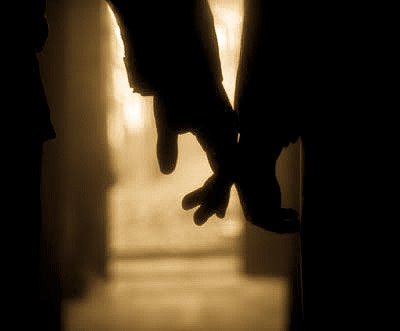
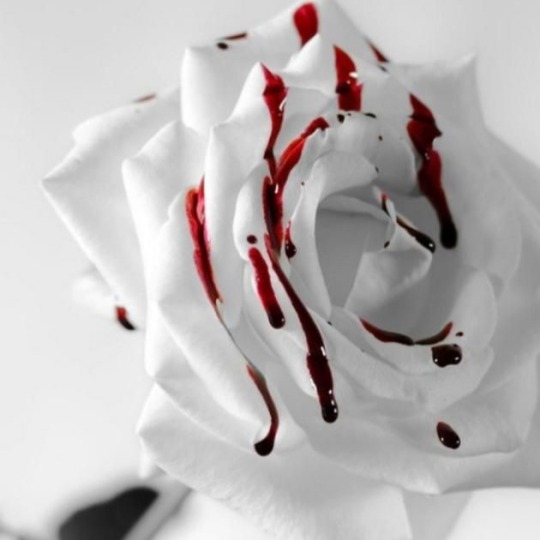
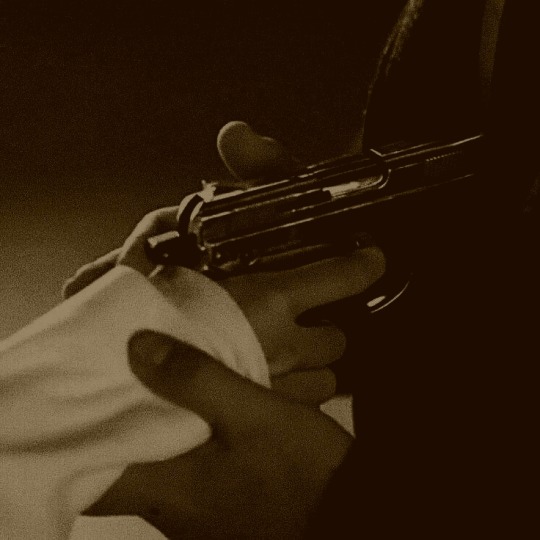


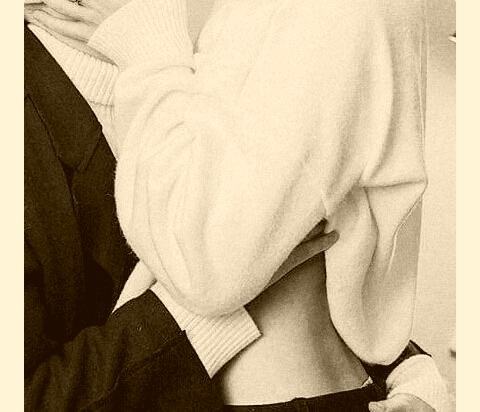


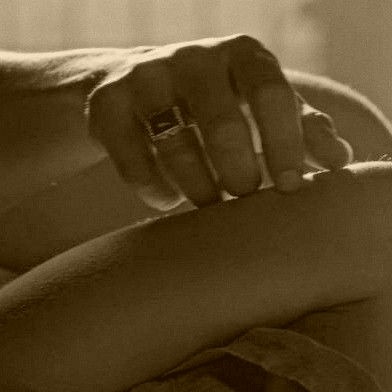
Mikoto Suoh & Tatara Totsuka
" I sat across from the reaper and he asked me "why? Why did you choose your own death? " I simply smiled back as I said "I chose love." Quote from redlovesashes
Killing Butterflies vibes
18 notes
·
View notes
Text
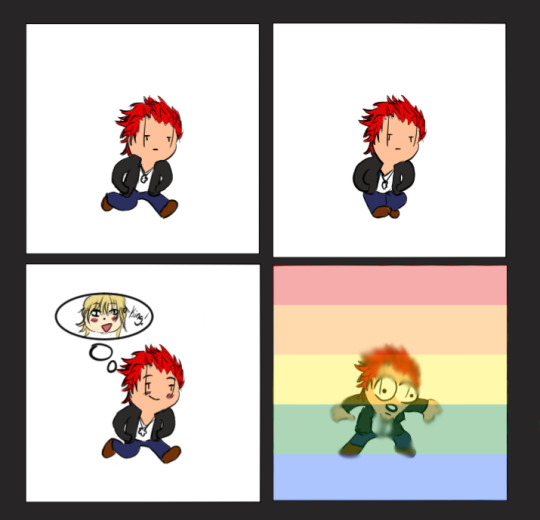
He's in love your honor
Template is here!
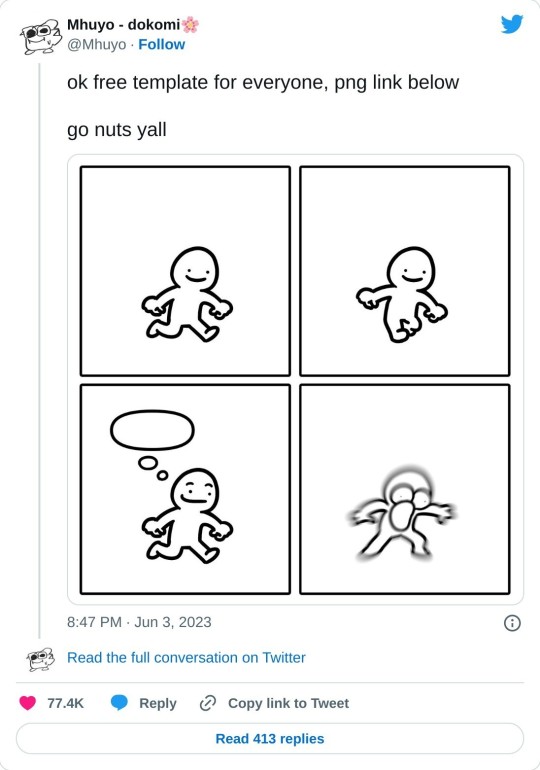
34 notes
·
View notes
Note
Yandere Tatara Totsuka from K Project?
Random Yandere Headcanons: Character headcanons: Tatara Totsuka

Out of all the k project yanderes to have he may be one of the best ones to have.
Of course, this also depends on how well his darling plays their cards.
He is a heavily delusional yandere.
Believing that he and his darling started dating only a short while after their first meeting.
He is a highly obsessive yandere.
All his pictures and videos will all be about his darling.
He loves spending time with them and will always try to worm his way into their day. (Every day.)
He is very affectionate with his darling which usually is hidden within his friendly nature.
#yandere#yandere headcanons#k project x reader#yandere k project#k project#tatara totsuka#yandere tatara totsuka
20 notes
·
View notes
Text
Happy Birthday, Tatara Totsuka! (K Project)

4 notes
·
View notes
Text

AAARGH i have wanted to draw this since i read ch9 of gakuen k manga (which you should go read on my translation acc btw hahahahahahhaah it’s a super goofy chapter)
also i realized halfway through drawing this that it’s kusanagi-san’s birthday but i have no more time to draw today… maybe tomorrow…?
#k project#k project fanart#totsuka tatara#tatara totsuka#i think it’s hilarious that i’ve drawn totsuka SO many times even though my favorite character is saruhiko#though to be fair saruhiko’s hair is kind of a pain to draw why is it so difficult…
21 notes
·
View notes
Text
Moving right along with a long-time fandom of mine, K! It's still the same Monopoly prompt, so I kept it limited to a specific clan and I have to say, it was a blast thinking about HOMRA playing Monopoly!
Send me a fandom and a number and I’ll tell you who in Monopoly:
Is the banker: It’s usually Izumo. Does he want to be the banker? No. Does he even want to be playing the game? No. So why is he doing it? Because the others convinced him to play and nominated him as banker.
Is overly protective of a certain game token and refuses to play until they get that token: Shouhei really wants to be the doggy. Like, he really, really wants to that token. Please let him have that token or you will hear about it the rest of the game.
Who is the person who everybody always suspects of cheating even though “OH MY GOD IT WAS ONE TIME”: It was multiple times. Every time, almost, if we’re to be exact. But Eric is a lousy cheater, always gets caught, and it’s become almost a tradition of playing Monopoly!
Is the person who cheats and gets away with it because no one suspects them: Totsuka. He just is so sweet natured and his smile is deceivingly innocent but make no mistake, he’s more than willing to play dirty if he has to.
Buys everything they land on with a YOLO approach and no strategy: Chitose. It’s Chitose every time and it never works for him. Yata will try to strategize most of the time and loses every time he does. Oddly enough, a YOLO approach and no strategy is the one way Yata has ever won.
Suggests that they liven it up with alcohol: Izumo, of course. Alcohol is one of his ‘things’, one of the subjects he knows a lot about and is somewhat passionate about.
Has a very stringent strategy and is willing to do strange requests and weird dares in exchange for the properties they want: Rikio actually usually has a strategy in place within the first fifteen minutes. He really doesn’t care too much if he has to do something silly or look a little foolish. He’s kind of used to not getting a lot of respect and hey, he does enjoy making others laugh and if doing so helps him win in the end, why not?
INSISTS that they play by the rulebook TO THE LETTER: Dewa really prefers to play by the rules. They’re written for a reason, they make the game easy to play and understand for everyone, and they usually keep the game from falling into the hours long mess that it normally does whenever HOMRA plays Monopoly.
Throws the rulebook in the other person’s face and makes up new rules to make it better: Yata is bad for this. Him and Bando and Akagi kind of all team up in making up new rules and they increasingly try to one-up each other in just how ridiculous the new rules get to the point where eventually, if the game hasn’t been won, it just becomes unplayable and unwinnable.
Has ridiculously good luck with the chance cards to the point of suspicion: Anna has so much luck with those chance cards. A lot of the boys think she might be cheating. They strongly suspect it. But they’d never come right out and accuse her of it, of course, because it’s Anna.
Lands on all the taxes and as a result vows to vote for a different candidate in the next election: I feel like Rikio has really bad luck when it comes to both chance cards and landing on taxes and he’d probably make this joke to make light of the situation and then the joke would spin off and become a complaint about politics and everyone would get all fired up about the subject and it might just lead to a fight even though he hadn’t meant it to because they’re all a bunch of idiots.
Goes bankrupt first: Poor Chitose. He doesn’t even really try to strategize and just sucks ass at the game, to be blunt about it. Monopoly is not his game…poker’s more his strong suit.
Which two people get into a screaming match: Honestly, it’s easier to list off who wouldn’t get into a screaming match, which was Totsuka, Izumo, and Fujishima. They rest of them either definitely would or could be goaded into doing so eventually.
Which two people are secretly collaborating for a joint victory: I feel like this would be Fujishima and Eric. The two are quite close and would be able to kind of figure out something without much talking between them and I feel like this would be Fujishima and Eric. The two are quite close and would either have a standing alliance for any games or would be able to communicate well non-verbally to agree to team up, and since they’re both fairly quiet people, nobody really notices them too much or gives a lot of thought to how they’ve managed to get so lucky.
Which two people are openly collaborating for a joint victory: Okay, but is there any question that Bando and Shohei are working together? Seriously, it’s so obvious that nobody could doubt it and, just in case anyone did, Bando’s an idiot who pretty much blurts it out at some point.
Who flips the table: I feel like a lot of these boys would table flip when the game got too hot and heated or things kept going sucky for them but I think, because he is so hot tempered, it’s probably Yata who does it the most.
Who is the sore winner who in any other circumstance would be the one flipping the table: Bando wouldn’t be above flipping a table, but probably wouldn’t do it often. Anytime he wins, which is rare but does happen, he is a horrible, horrible winner though who gets very cocky.
Who anonymously calls in a bomb threat to end the game early: I feel like this would be either Dewa or Izumo. They just really, really want the game to be over. They’ve wanted it to be over from the start but ended up roped into it by more enthusiastic friends.
Who is the smart person who refuses to play in the first place: Mikoto might watch. He might even find it amusing at points. But you’re out of your fucking mind if you think anyone would be getting him to play Monopoly with them.
#fandom prompt#k#k the anime#project k#homra#mikoto suoh#dewa masaomi#izumo kusanagi#anna kushina#k project#misaki yata#kamamoto rikio#tatara totsuka#akagi shouhei#shouhei akagi#saburouta bando#bandou saburouta#you chitose#chitose you#eric surt#kosuke fujishima
20 notes
·
View notes
Text
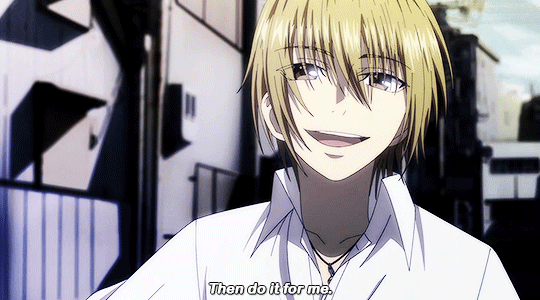
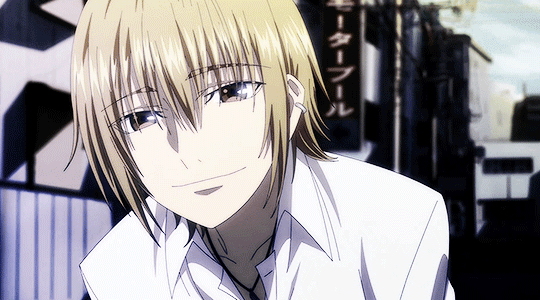
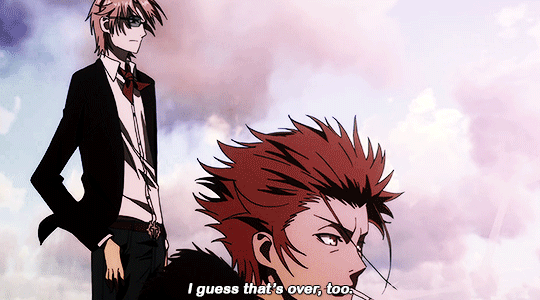
A dangerous king like you needs his rightful place. A place where you can take naps, be fed, and be entertained. Not for your sake, but for the public. I don’t give a damn about the public.
#kprojectedit#fyanimegifs#anisource#k project#tatara totsuka#mikoto suoh#izumo kusanagi#mikototsu#*mine
103 notes
·
View notes
Text
I lowkey made
A tiny sad Mikototsu amv 😭😭
16 notes
·
View notes
Photo
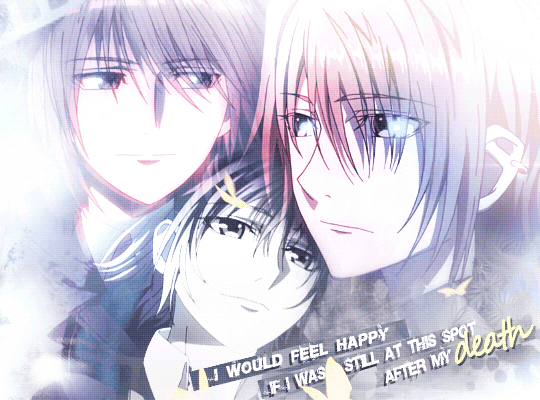
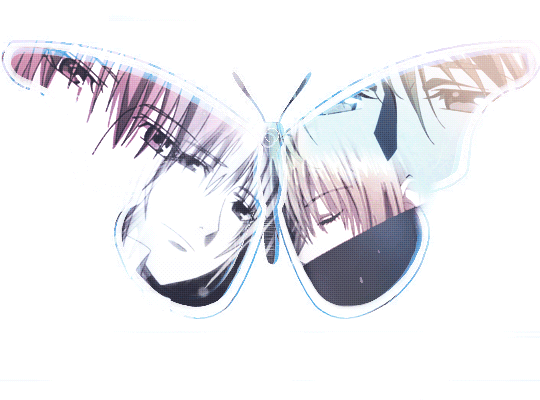

#k project#project k#k-project#totsuka tatara#tatara totsuka#my graphics#he holds a special place in my heart#this has been lying in my drafts for a while...
99 notes
·
View notes
Text
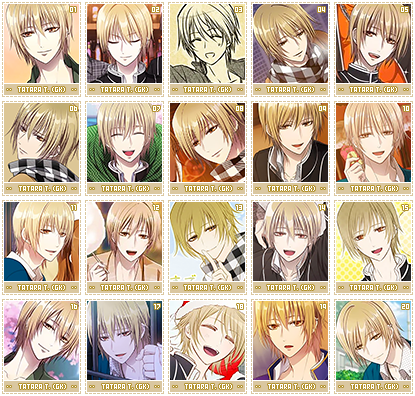
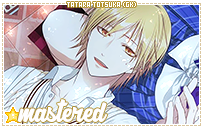
#264 - Tatara Totsuka from K Project: Wonderful School Days
2 notes
·
View notes